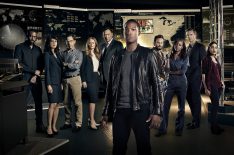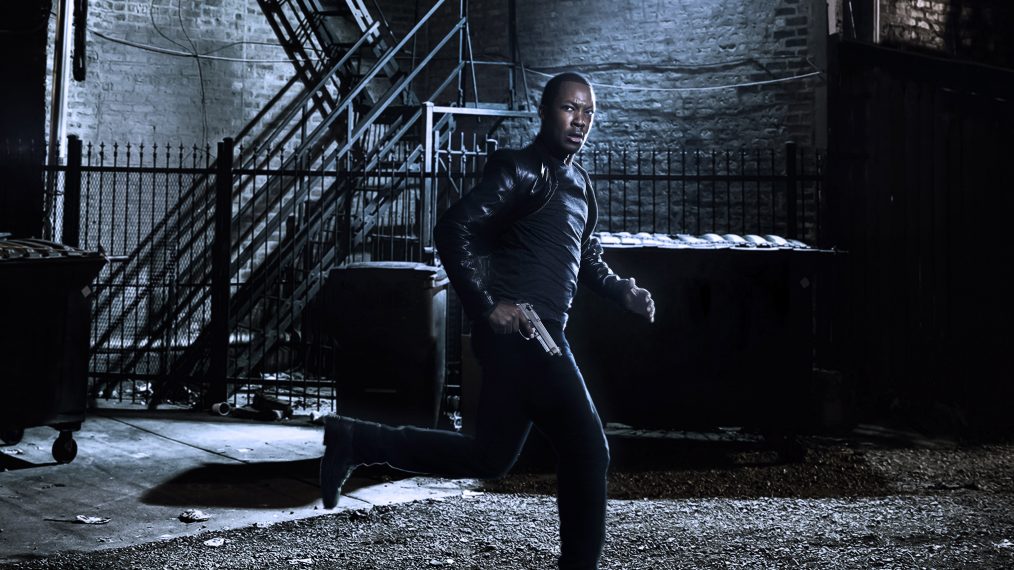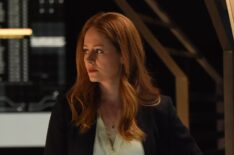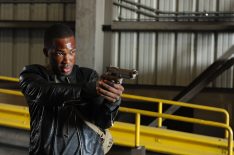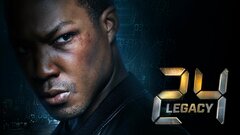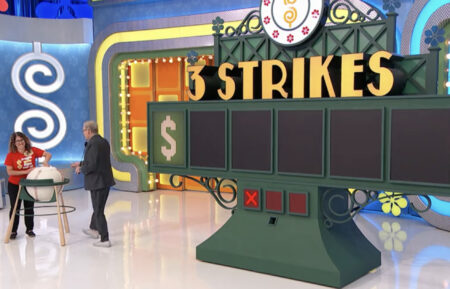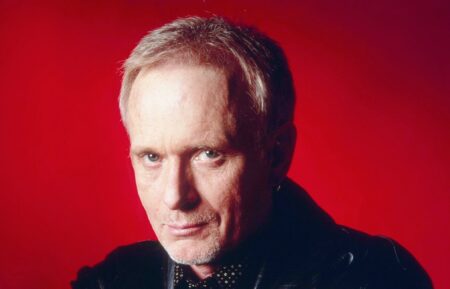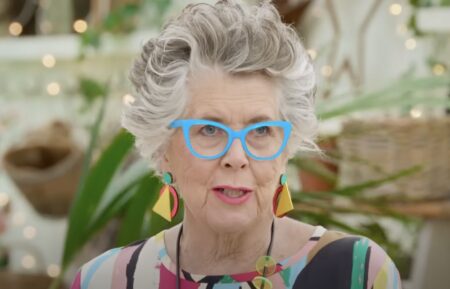Jimmy Smits on Being Drawn to the Complexities of the ’24: Legacy’ Universe
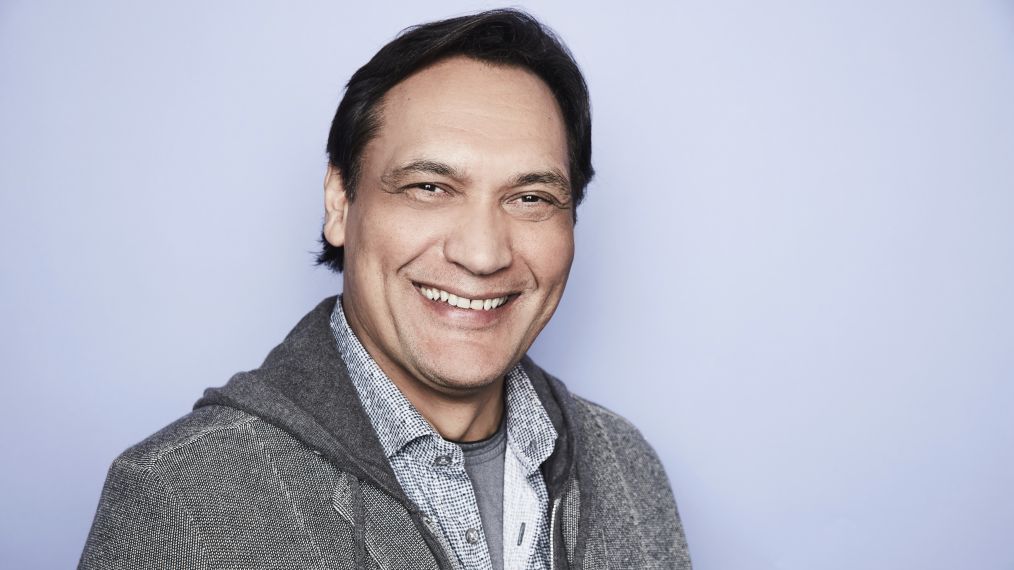
Q&A
Jimmy Smits’ resume prior to 24: Legacy is one most actors could only dream of—L.A. Law, NYPD Blue, The West Wing, Dexter, and Sons of Anarchy are among his many credits over the past three decades. But with Smits’ role in the pilot of Legacy limited, signing on to the Fox series took conversations with the producers and “a big leap of faith,” he recalls.
The actor talks with us about the complexities of his character, being there for Corey Hawkins (Eric Carter) on his first day, and more.
The producers mentioned it took talking things over a few cigars to get you to sign on. What did you need to hear about where the story was going in order to sign on?
It wasn’t so much about where the story was going to go; it was more about trying to see if we were able to vibe as a group. I’m in the pilot for like 2 minutes and 30 seconds, and it was written that way. So, that’s a big leap of faith. It’s not even that it’s sketchy, it’s more about the fact that the story at that point isn’t about that. What were their plans?
I was really happy to know that Stephen Hopkins was [directing] that pilot, because I think he did such a great job on what became such an iconic way [with the original series]—what he did with that, visually, has become a template. The fact that Howard Gordon worked on the show and was involved in Homeland, which is very important [for] me, I can get a sense of his sense of where political stories can possibly go. And the fact that [executive producers] Manny [Coto] and Evan [Katz] had worked on the first incarnation, there’s a great template here, there are people who know how to do this.
Then to know that Corey was involved, and they were not talking about replacing versus reinvigorating it with a different kind of set of characters and a different dynamic. I love what he did in [Straight Outta] Compton. And he’s an actor—and I’m seeing it more when I’m watching him work—but he’s an actor who comes with a toolbox, because this is a craft. He’s got chops. He’s trained. And then Miranda [Otto]’s work—I’m a fan of Homeland, so the work she did on that show was great. She’s got a theatre background, which is always great. There were these little things that I needed to find out.
And then tell me what you want to explore in terms of this facet of the storyline. I love the fact that they have very proactive women and the landscape in this version is very diverse. It feels like how this country is in a lot of ways. They talked about a high-powered political couple in Washington and wanting to explore that in the framework of this genre piece. But to say that 24 operates on an action level, I don’t think fans of this show…that’s a component of it, but you have to have that other stuff going on—that character stuff. The relationship dynamics.
I think of my friend Cherry Jones, when she was on the show [as President Taylor]. There was a lot of stuff going on. So, it was talking through what they wanted to explore. This kind of relationship between this type of couple, and there are parallels in our business, too. When one person makes a sacrifice for the other, though they’re both on these career tracks—she was at CTU before and captured this guy; now we’re going to go into the political [world]—that’s the framework or jumping point of where the relationship is at within the dynamic of one particular day. All bets are off. Things change. You see the change that has to happen because of what happens in that day; that sounds great. It’s about how do we find a way to execute it.
It does take a special kind of relationship to put your ambition to the side to let your partner shine.
They’re driven people. We haven’t talked about that a lot, but in my own little book of what I’ve written down, yeah, I think when you know the person you’re in love with, you know their little tendencies. You know the part of the dynamics of the relationship. We’re exploring all of that, which has been great.
24 is certainly a show where at any point everything viewers know about a character could be thrown out the window. How much did you need to know about your season-long arc and how essential is that to your performance?
I’m going to go back to my theatrical roots and all that stuff. I’m more comfortable being in a zone when I feel as an actor I can score what I’m doing so it has little cogs in the wheel there. But it’s not lost on me—and I’m not just talking about the genre, just working on television—that that is not always possible. The canvas is much larger and things change, and it has to be fluid. You have to be able to be fluid. You do your homework. You’re a sponge in a lot of ways. You take the information you hear from writers or producers or creators and internalize that and put that into the schematic of what you want to do with the character. Knowing that at any given day, you might get a curveball and that might change. And you have to be able to roll with that. Sometimes, that hasn’t always suited me well. I haven’t been able to do that. [Laughs] Information is power. It just helps me flesh out. I take what I do seriously. It is a craft. Just like—I tend to sit on apple-boxes with the crew, because what I do is a craft just like what the makeup and lighting people do. I have to go with the flow because I’m on board to go with the flow. But they know that about me. And if it takes a left turn, I’ll have to go back to what I’ve scored and see what is possible; what we can figure [out]. It is a kind of given when you’re doing a soap opera or something like that that those things change so drastically that sometimes it’s hard on a performance aspect to deal with that. Again, these guys have done it before.
What excites you about Donovan?
What’s important for me is that I—and I’m grappling with this with the genre and the dynamic of the real-time—is that you still get a sense of the seriousness of his political ambitions. That you get a sense of the true love in terms of what the relationship is. And if I’m able to sell that in the short amount of time I have, when we start to tumble, the audience will be able to go for that particular part of the ride. As they have to go with Corey. Not that it’s much more delineated, but it’s a different type of thing because of the action and stuff.
What kind of a presidential candidate is he?
Without doing a lot of spoilers, we have to deal with the fact that we’re in one particular day, so I think it’s more about a peeling away and a disintegration, but there is an aspect to that. And one of the things in terms of performing it as an actor, is things have to be a little bit more amped up, because we’re talking about serious stuff on one particular day; to try and get the whole relationship thing in. In every scene, we have to remind ourselves sometimes that you have to earn the breaths you take, because the reality is, there’s a lot of s–t going on.
He has a complicated relationship with his father, who may be up to some shady business. How do you see that dynamic working?
They’ve had some touching scenes already. It’s going to be an exploration of familial trust and what happens when that goes south. You feel the crime statistics—and this has nothing to do with politics—but the family betrayals can be…they can really turn on a dime. Big time.
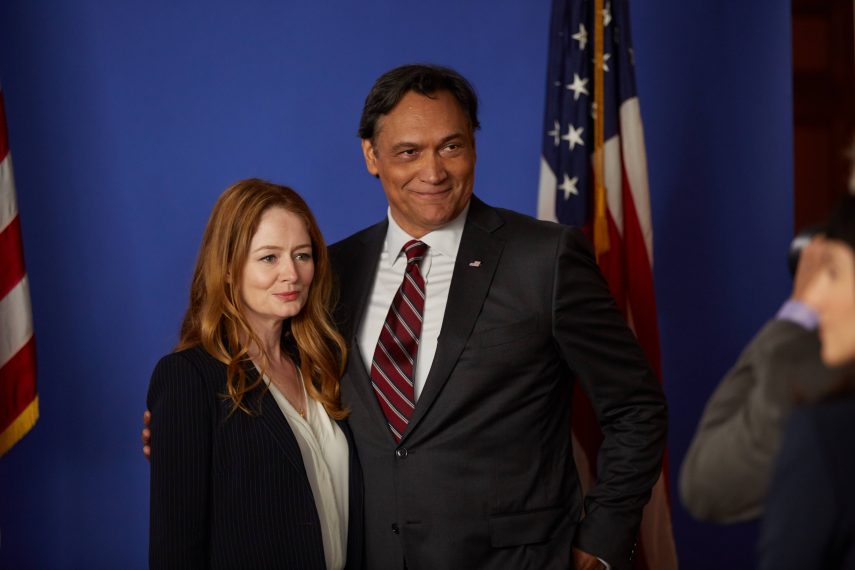
The future First Couple?
Outside of being a fan of Miranda, how has it been working with her?
I’m happy. I’m happy with this group in general, because they’re all gung-ho and into talking about the work. Specifically with Miranda, the vibe with us has a theatre thing to it. The dynamics of the scene are not on a superficial level. Just trying to find ways to deepen it as much as possible. We’re talking about minuscule little chances and times to do it. A little touch, a caress, I’ve never experienced that before; it becomes much more crucial.
You also came to set for Corey’s first day of filming…even though you had wrapped production on the pilot. What prompted that?
I mean, that’s part of me: I do that. I’ve done that before on other sets. I specifically picked that day because I knew on that day he had a tough action sequence and…I know there’s a lot on the shoulders there. When you know the crew is behind you—not just the physical crew, but your group—it might mean something. Our characters at this point don’t have an interaction, because there are different storylines going on. It’s just important for me, because we do have to be a unified cast. It helps.
Do you have a certain approach when you’re working with a young actor who may be on the verge of a major breakout role?
I’m not sage advice-giver. But I’ve been around the block. I understand the machine, a little bit. And I know that as much as this business is as full of highs, disappointment is part of it, also. So I’ll leave it at that. What we talk about in the business is more personal. It’s how to navigate the waters. I’ve told him that, and I would tell that to any young actor. Who is to say what’s the right path to choose, because you have so many, especially, now. But to talk about it helps. The notion, because of social media, has changed so much. The idea of what is an idea of celebrity versus what I feel we do, it’s very kind of different. I’m not really a big social media person, but I see the f—ing value in it, so much. I don’t know if you have to tell people what you had for lunch. But in terms of getting word out and all that stuff. In terms of the paths you go, what could be the potential pitfalls, that’s the kind of talks we have.
You’ve been on your share of iconic shows in the past. Do you approach a role differently when you know you’re stepping into a franchise that has a rich history?
When I hear that and I think about that, I think about the blessings that have come. I know a lot of, lot of, lot of f—ing talented actors who don’t get the shots. It’s never lost on me.
My compass is always, keep trying to mix it up, keep trying to do different things. And again, the road, there’s no casting aspersions on someone who stays on a show for a dozen years. You can make a good life. Sometimes I wonder, hmmm. But I guess because of my background, to keep mixing it up and doing different things, especially in this form of media that goes on for a while. It’s a good thing for me. So here was a chance to be involved in something that hasn’t been as much a part of my wheelhouse. I’m just trying to grapple with—and I’m going to be very honest with you, and I do it with the guys when I’m talking to them—try[ing to] keep the character vibrant and complicated and the relationships complicated. Because it’s easy to fall into the other stuff and I don’t want to do that. Jimmy won’t be happy doing that.
24: Legacy, Mondays, 8/7c, Fox

